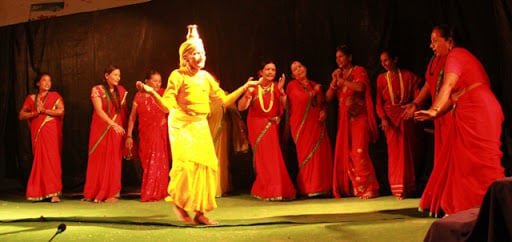Theater thriving in Itahari with 'Thinking global, acting local'

Kathmandu - Birat Anupam Successful British playwright and theatre director Edward Bond's famous saying 'I think there is no world without theatre' is found aptly translated in the artistic scene of Itahari, an evolving city in East Nepal. From poets to school-goers and from downtown homemakers to suburb kids, all are immersed in the theatric euphoria in this transit town where roadways from east to west and south to north of eastern Nepal intersect.
However, theatre was not a household name before dynamic young theatre artist and director Sonu Jayanti threw his artistic weight behind the theatric activism. A popular poet Manu Manjil was another heavyweight to propel this theatric sensation in the town since a decade. Of course, there were few scattered theatre activists in Itahari even before Sonu Jayanti gave his full-fledged time for this performance art.
Shyam Bhai Gautam, Ramesh Kumar Bista, Basanta Subedi, Lekhnath Parajuli, Kalpana Chaudhari, Bhadra Thapa Magar, among others, were known theatre figures from this town. Realizing their huge contribution and dedication, Sonu Jayanti hosted a cultural program titled 'Tyi din' (roughly translated as 'those days'. Tyi din in, 2065 BS, featured catchy glimpses of theatric performance, singing and dancing from these senior artists of the town.
'It was our goal to display brief peek of plays, dance and songs in the past performed by our living veterans,' explains Sonu Jayanti elaborating the cause of this unique cultural function and adds, 'we accomplished our program beyond our expectations.' Theatre for all: from School Theatre to Eco Theatre Multiple theatric programs like 'School Theatre', 'Home Theatre', 'Village Theatre' and 'Eco Theatre' have been unveiled. School Theatre accommodated school-goers to equip theatric activities. Seventh edition of School Theatre has been accomplished in 2019.
Its first edition was initiated in 2066 BS. Home Theatre was for working mothers and professional women. More than 35 women have joined this category staging multiple plays, most recently about violence against women on the occasional of International Women's Day. Likewise, Village Theatre has trained dozens of village children. Likewise, Eco Theatre has mentored many dozens children on environmental concerns including climate change, global warming and deforestation through various dramas.
Expanding theatric penetration in the town Veteran theatre artists Abhi Subedi, Sunil Pokhrel, Ganesh Rashik among others have observed and praised the theatric developments initiated by Kalalaya, the organization pioneered and presided by Sonu Jayanti. Because of this expanding and encouraging theatric activism, theatre penetration in Itahari is so deep and wide that almost every school send their children for School Theatre and various social organizations like Jaycees and Women's groups occasionally stage plays after training by Sonu Jayanti.
It has organized international theatric function also. From 29 November to 4 of December of 2019, Kalalaya organized a program titled 'Antardesiya Sajha Rangamanch' featuring a theatre group called 'Krishnanagar Sinchan' from West Bengal, India 'Artists are more important than theatre hall' Despite such an appreciated public response on theatre, Sonu Jayanti does not buy the idea to erect a theatre hall for regular plays. 'We have seen theatres halls remaining unused.
Even the Gurukul in Biratnagar is not fully used as per its expectations', explains Jayanti. 'Therefore, we focus on skills not on structures. Structure will not be a problem if we have plenty of skilled theatre artists. Theatre artists can survive without own theatre hall but theatre hall cannot breathe without artists.'
Jayanti, who is in theatre since 2049 BS, says three dozens of young theatre artists produced by Kalalaya are strong assets to theatric development in the town. Poetic theatre and theatric poetry The important ingredient of theatric plays in Itahari is that they accommodate poems. The play staging famous poem 'Uni jeebanko rangle kawitaa lekhchhin' (loosely translated as 'She writes poetry by life's color') by poet Manu Manjil was widely appreciated by people and press.
Most recently a poem called 'Aama' (mother) penned by poet Dewan Kirati was also staged on International Women's Day'. In this way, Kalalaya blends theatre with poetry and poetry with theatre drawing huge footfall. About blending poem and play, Sonu Jayanti says, 'I guess theatre is an expansion of poetry and it is always enthralling to stage beautifully crafted poems'.
Unscripted and organic plays Sonu Jayanti does not make formal script to mentor theatre enthusiasts. Instead, he guides the ideas pioneered by trainees with his imagination. 'I don't have a script on paper but I have imagination which I pour into our closed-door sessions, says this versatile theatre director. 'Script is all about formality but the imagination is a kind of meditation and reality making best outcomes.
' 'Because of this trend, we are supported by non-theatric personalities of our town like Deepak Gautam, Rewati Dulal, UmeshSubedi, and the likes,' he said. 'Thinking global, playing local' None of the plays staged by Kalalaya and its artists is of foreign origins. They stage plays made by locals and about local culture and traditions.
'Without knowing our roots, we cannot be theatre activists and to portray this sentiment on plays, we search and stage organic dramas and organic stories,' he explains. We read foreign dramas and foreign trends also but stage our play in our own way and on our own stories, says Jayanti adding, 'it is like thinking global, acting local.'









Leave Comment